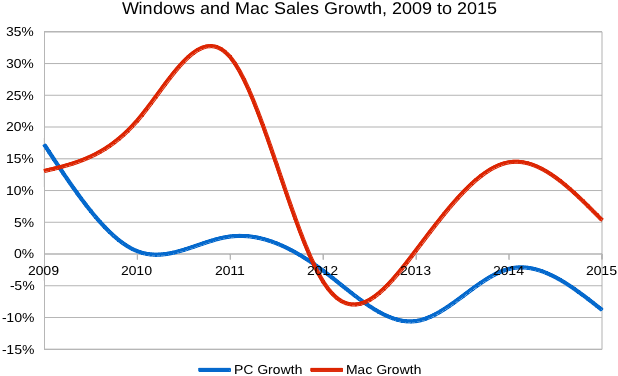I’ve just finished wading through 6+ years worth of press releases from Gartner Group, digging out quarterly PC sales results from Holiday Quarter 2008 through 2nd Quarter 2016. Why? Because the global PC market is in decline, and I wanted to see how Mac sales compared to Windows sales.
For those of you who like to read the last page of a mystery novel first, the good news is that while the overall PC market (tablets not included) has dropped in volume every year since 2011, Macs unit sales have increased every year since 2003 with the exception of 2012.
Apple, the Silver Lining
That’s just the executive summary. According to Gartner’s worldwide PC sales data and Apple’s quarterly sales figures, Macs accounted for on 3.2% of unit sales in 2009 and now account for 7.1%.
The last year the PC market grew was in 2011, with 346 million Windows PC sold and 17.8 million Macs. Macs accounted for 4.9% of all units sold in the PC market in 2011.

Apple had one annual sales drop during this seven year period. Windows, four in a row.
In 2012, the Windows market declined by 2.6%. In 2013, by 10.6%. In 2014, another 2.3%. And in 2015, 8.8% less units sold – just 268 million. That’s an average of 6% annually over the past four years.
Macs declined in sales by 4.4% in 2012, worse performance than the Windows market – but the only decline in over a dozen years.
Mac sales increased by 0.6% in 2013, the same year Windows sales dropped 10.6%. In 2014, Apple sold 14.4% more Macs while the Windows market sold 2.3% less. And last year, the Mac market grew by 5.3% while Windows took a bath, declining by 8.8%. Apple sold over 20 million Macs in 2015, the first time it has reached such a level. (In 2008, it was below 10 million.)
Gartner and IDG are predicting equally gloomy results for Windows vendors in 2016, and they are blaming Microsoft for some of it. Why? Because a lot of the Windows users who were upgraded to Windows 10 – whether they really wanted it, couldn’t figure out how to decline it, or got tired of saying No to a free upgrade – decided to stick with the hardware they already have a while longer.
Most Users Never Upgrade
As I pointed out recently, a lot of computer owners never upgrade their hardware. Whatever amount of RAM and whatever size hard drive it came with, that’s what they stick with. And much of the time they don’t upgrade their operating system either, sticking with what they know until a newer computer forces them to use a new version.
That happens in both the Windows and Mac worlds, but Apple has been giving away free Mac OS upgrades for almost four years, while Microsoft has never done it before (not counting incremental upgrades like Windows 8 to 8.1).
We actually have two separate things happening in the Windows market. Users have been getting free Windows upgrades, and some are content to stick with the PC they have. Meanwhile, a lot of retailers have been betting against Windows 10 and stocking PCs with Windows 8.1 installed, which vendors are happy to provide, so even people buying a new PC have been pushed toward a less new version of Windows.
What Does the Future Look Like?
Smartphones have replaced iPods, cameras, and portable gaming devices for a lot of people, and they have also taken a larger role in email, messaging, social media, and research. Tablets are replacing laptop computers for some, desktop machines for a few others. Between them, smartphones and tablets have been cutting into the personal computer market. Even Apple had a down year.
We are going to see the Windows market continue its decline. Windows smartphones are rarely seen in the wild, and Windows tablets take a distant third behind iPads and Android tablets. Windows is essentially a computer-only operating system, despite Microsoft’s best efforts to get people to buy the Surface.
iPads and Android tablets are going to replace a lot of notebook computers, especially with Bluetooth keyboards readily available for them. I have a feeling they are going to be very popular throughout the education market.
Apple will grow stronger as the only vendor consistently growing its personal computer market and the only vendor to offer the kind of integration between Macs and iPhones and iPads and Apple TV and Apple Watch out there.
Android does well in the mobile world, but not on the desktop. It has to integrate well with Windows and Macs, giving no preference to either platform.
Windows is descendant, while Macs are in the ascent. Soon Macs will account for 10% of the computer market, then 12%, then 15%, and the trend will continue because the Windows market is dying. (There’s a reason Microsoft says Windows 10 is its final version.)
Even if Mac sales go into decline, it will be at a slower rate than the Windows world. Mac users, we are here for the long haul.
Keywords: #marketshare #macmarketshare #pcmarketshare #windowsmarketshare
Short link: http://goo.gl/YYZZdN

